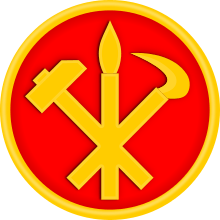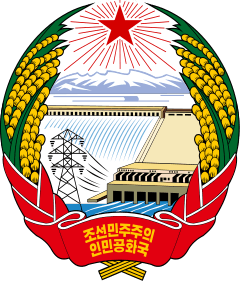Organization and Guidance Department
The Organization and Guidance Department (OGD) is an agency of the Central Committee of the Workers' Party of Korea (WPK), the ruling party of North Korea. Its main responsibility is to "completely implement the teaching and decisions of the Suryeong [Great Leader]," President Kim Il-sung.[1] The department was initially a division within the WPK General Affairs Department, but eventually spun off and was established at the 3rd Plenary Session of the 2nd Central Committee as the Organization Committee.[2]
 Emblem of the Workers' Party of Korea | |
| Agency overview | |
|---|---|
| Formed | 15 September 1948 |
| Preceding agency |
|
| Jurisdiction | Party, state and military |
| Headquarters | Pyongyang, North Korea |
| Agency executives |
|
| Parent agency | Central Committee |
 |
|---|
| This article is part of a series on the politics and government of North Korea |
|
|
|
|
|
|
|
Power
According to North Korean defector Jang Jin-sung, the OGD is "the only entity that actually matters when it comes to decision-making or policy-making" and reflects the autocratic structure of the government.[3] North Korean specialist Nicolas Levi refers to the OGD as "The heart of the North Korean political system".[4]
Hwang Jang-yop, another high-ranking defector, stated that the leading figures of North Korea belong to the OGD.[4] Its officials regularly accompany the Supreme Leader during inspections and field guidance appearances.[4] Some of its powers were given to the WPK Administrative Department (AD), in a bid to weaken the influence of those working in the OGD.[1] However, with the execution of Jang Song-thaek, the AD Head, the AD itself was abolished not long after in February 2014.[5]
There are those, most prominently the defector Jang Jin-sung, who currently argue that the leaders of the OGD are the real leaders of North Korea, and that Kim Jong-un is a puppet.[6][7] He argues that Hwang Pyong-so, the First Deputy Head of the OGD, through his post as Director of the General Political Bureau of the Korean People's Army, was the real ruler of the country because (Jang believes) he controlled the appointments and dismissals of military officers.[7] He concluded that Kim Jong-un would remain a puppet as long as Kim Jong-il's old proteges still controlled the OGD.[7] Michael Madden of the North Korea Leadership Watch disagrees, claiming instead that the OGD implements the directives of the Supreme Leader, and is not powerful enough to introduce directives itself.[7] In October 2017 the WPK central committee appointed Kim Jong-un's trusted aide Choe Ryong-hae as director.[8][9] The current first deputy director is Hwang Pyong-so.[9] Other deputy directors include Kim Kyong-ok, Ri Man-gon,[10] and Jo Yong-won.[11]
Leadership
The OGD head is usually one of the most influential figures in the country, this being proven by the fact that Kim Jong-il (the Party General Secretary from 1997 to 2011) headed the OGD from February 1974 until his death in 2011,[1] and that the first head of the OGD was Kim Il-sung, the founder of the North Korean state.[2] Under Kim Jong-il's stewardship, the OGD was turned into the centre of power within the WPK.[1] Deputy heads (sometimes referred to as deputy directors) are leading figures within the North Korean establishment, with one likening them to "a kind of elite priesthood in the DPRK."[1]
It should be noticed that not all deputy heads are actually involved in the affairs of the OGD, since the title itself gives them special status.[1] For instance, members of the WPK Secretariat are by right deputy heads of the OGD, this right was extended to certain members of Kim Jong-il's Personal Secretariat and key diplomats.[1] The reason being that officials working within the OGD are not under the jurisdiction of state law or party bylaws (having been so since the 1980s when Kim Jong-il issued a memorandum which turned the OGD into a secret organization of sorts).[1] Sanctions against deputy heads are kept confidential from the rest of the party.[1]
Despite these benefits, deputy heads are under the personal surveillance of the Great Leader; for instance, in the 1990s Yun Sung-kwan, as deputy head, assumed control over the affairs of the OGD on a two years basis, but was removed since Kim Jong-il believed he had amassed too much power in his own hands.[1] A similar case took place in 2003, when Jang Song-thaek was dismissed.[1]
|
Heads
|
Deputy heads
|
Organizational structure
Subdivisions of the OGD include:[1]
- Office for Party Life
- Office of Comprehensive Affairs
- Office for Appeals
- Office for Local Guidance
- Office for Membership Registration
References
Footnotes
- Madden, Michael (October 2009). "KWP Central Committee Organization and Guidance Department" (PDF). North Korea Leadership Watch. Retrieved 12 June 2014.
- Suh 1988, p. 92.
- Ye-seul, Suh (19 May 2014). "'Worker's Party holds the real power in North Korea'". Retrieved 12 June 2014.
- Levi, Nicolas (27 June 2013). "The Organization and Guidance Department". New Focus International. Retrieved 12 June 2014.
- Lipes, Joshua (8 April 2014). "Senior Officials From Dismantled North Korean Department Demoted". Radio Free Asia. Retrieved 12 June 2014.
- Jang Jin-sung (2014). Dear Leader: Poet, Spy, Escapee—A Look Inside North Korea. 37 Ink. ISBN 978-1476766553.
- Madden, Michael; Jang, Jin-sung; Green, Christopher (27 May 2014). "Kim Jong-un: North Korea's supreme leader or state puppet?". The Guardian. Retrieved 12 June 2014.
- "Choe Ryong Hae appointed N.K. party's highest position". english.donga.com. Retrieved 2018-01-26.
- Zwirko, Colin (28 December 2018). "North Korean leadership shakeups revealed in latest MOU reference book release". NK News. Retrieved 7 March 2019.
- "Kim Yong Chun Funeral Held". North Korea Leadership Watch. 22 August 2018. Retrieved 7 March 2019.
- Hotham, Oliver (7 January 2019). "Jo Yong Won was Kim Jong Un's most prominent official in 2018, data reveals". NK News. Retrieved 7 March 2019.
- "Choe Ryong Hae to OGD? [revised 13 JAN 2018]". North Korea Leadership Watch. 13 January 2018. Retrieved 26 January 2019.
- "Central Message Meeting Held". North Korea Leadership Watch. 9 September 2018. Retrieved 17 October 2018.
Bibliography
- Suh, Dae-sook (1988). Kim Il Sung: The North Korean Leader (1st ed.). Columbia University Press. ISBN 0231065736.